FINALLY.
The Obama administration says it is "concerned" by disturbing acts by the Rwandan government in the run up to the country's elections that President Paul Kagame won.
Ya think?
Beside the fact that Kagame polled 93% of the vote (yeah right), newspapers were suspended prior to the vote, opposition parties were barred, journalists arrested, beside all that the election went well.
Then after the election the opposition FDU-Ikingi party president Victoire Ingabire Umuhoza, was indicted for allegedly denying the 1994 genocide, a serious offence in Rwanda, and locked out of the race. An American lawyer who flew to be her attorney was also arrested and detained for days.
Oh and then another journalist was shot dead after offering up a story the government didn't like.
Yet as usual with this White House even as it criticized and chided, it then didn't.
"We hope the (Rwandan) leadership will take steps toward more democratic governance, increased respect for minority and opposition views, and continued peace," the White House statement concluded.
Whatever.
The following is from the SF Bay View.
Rwanda’s Victoire Ingabire Umuhoza speaks to Women’s International News Gathering Service
by Ann Garrison
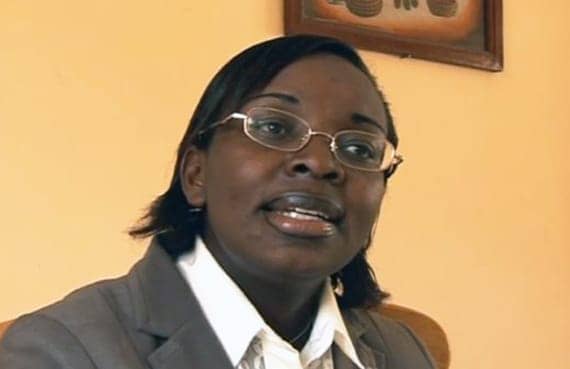 [2]
[2]
Rwanda’s FDU-Inkingi Party leader, peace and social justice activist Victoire Ingabire Umuhoza [3], spoke to Ann Garrison for Womens’ International News Gathering Service (WINGS) [4] in July 2010, near the close of Rwanda’s 2010 presidential election year, which was really an election stage play complete with election observers from the U.S. and the U.K. Incumbent Rwandan President Paul Kagame was “re-elected” on Aug. 9, receiving 93 percent of the vote, an implausible victory in any pluralist democracy, though 3 percent less than the 96 percent he received in Rwanda’s 2003 presidential election.
On Aug. 13, President Barack Obama’s National Security Council issued a statement [5] expressing concern about disturbing events leading up to the polls, including human rights abuse, suppression of the press and the exclusion of the opposition. NSC spokesman Mike Hammer wrote: “Democracy is about more than holding elections. A democracy reflects the will of the people, where minority voices are heard and respected, where opposition candidates run on the issues without threat or intimidation, where freedom of expression and freedom of the press are protected.”
The statement, notably, did not congratulate President Paul Kagame on his re-election.
Human rights activists and Africa advocates, including the Africa Faith and Justice Network [7] and Friends of the Congo [8], have called for sustained attention on Rwanda, suspension of all military aid and a freeze on $240 million worth of non-military aid until Kagame releases all political prisoners, lifts bans on the press and opens political space. All the issues that Victoire and I discussed in July and throughout this year remain, including:
Welcome to WINGS, a series of news and current affairs programs by and about women around the world, produced and distributed by the Womens’ International News Gathering Service.
Ann Garrison: In January this year, 2010, Victoire Ingabire Umuhoza returned to her native Rwanda, an East African nation of 10 million people. She had been in Europe for 16 years, where she earned degrees in business and commercial law, worked for an international accounting firm, married and had three children, and became the exile leader of the Unified Democratic Forces, a coalition of Rwandan political parties.
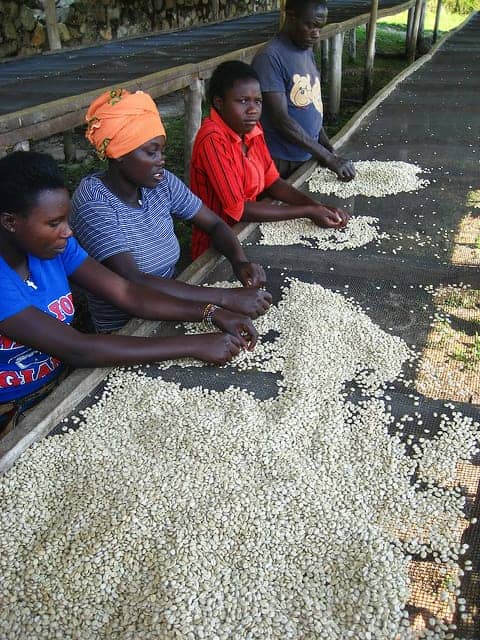 [10]
[10]
She returned to contest Rwanda’s 2010 presidential election, to run against incumbent Rwandan President Paul Kagame. Many observers believe that she would have been the leading candidate had she been able to officially enter the race. Instead, she was arrested and forbidden to leave Kigali City to speak to the majority of Rwandans, 90 percent of whom are rural subsistence farmers suffering extreme poverty, malnutrition, illiteracy, high infant mortality and low life expectancy.
Three months after her return, in a speech commemorating the victims of the 1994 Rwanda genocide, President Paul Kagame referred to her as a political hooligan but refused to speak her name:
Rwandan President Paul Kagame (recorded on April 7, 2010): “Some people want to encourage political hooliganism. Some people just come from nowhere, useless people. I see every time in the pictures, you know, some lady, who had her deputy, a genocide criminal, her deputy, talking about, you know, “You know there is Rwanda genocide, but there is another” – so that is politics. And the world says “the opposition leader!” Well, I know those who say it and who support that. They know it is wrong, but it is an expression of contempt these people have for Rwandans and for Africans, that they think Africans deserve to be led by these hooligans. And that’s – to that we say no, a big no. And if anybody wants a fight there, we will give them a fight.”
Ann: Kagame has indeed, since that statement, given Victoire and all his other serious political opponents a big fight, though few would call it a fair one. On June 24, Rwandan police surrounded the house Victoire had been renting in Kigali and threw up roadblocks to prevent her exit or entry. On the same day, police arrested another presidential candidate, Bernard Ntaganda, several of Ntaganda’s party members disappeared, and police arrested dozens of opposition party members who were attempting to protest their exclusion from the presidential election, which was, by then, only six weeks away. Also on the same day, Umuvugizi journalist Jean Leonard Rugambage was gunned down in front of his home in Kigali after he reported that Rwandan President Paul Kagame had ordered the assassination attempt on an exiled Rwandan general in Johannesburg, South Africa.
Reports of arrest, torture and even assassination of opposition politicians and press critical of Kagame have continued since.
On July 11, Victoire Ingabire spoke to WINGS from Kigali, despite the state’s warning that she might be arrested again if she continues to speak to the press. She speaks Dutch, French and her native Kinyarwanda language and, in recent months, she has learned English so as to speak to citizens of the U.S. and the U.K., the powers that have been dominant in the region since the Rwanda genocide.
Ann: Welcome, Victoire, and thank you for agreeing to speak to WINGS, despite the danger that it puts you in.
Victoire: You are welcome and thank you for your interest for the plight of Rwanda people.
Ann: Can you describe the state of your party, the FDU-Inkingi Party, and the opposition parties today? How many remain under arrest? How many have been freed? How many are missing?
Victoire: So far, only two members of opposition arrested on 24 June remain in detention. You know that Bernard Ntaganda, the founder and president of PS Imberakuri [political party] is still in jail. And Alice Muhirwa, who is the treasurer of FDU-Inkingi, you know that she is now still recovering from torture meted against her by police during her detention. And Mr. Luswanga Toba, the secretary of Mr. Ntaganda, who disappeared on 20 June – even till today, we don’t know where he is.
And there are also seven members of PS Imberakuri – we don’t know where they are. And people complained to the court about torture and showed the scars and the other evidence of torture. But the ruling of the judge eluded this issue. It is a kind of blank check to the police to go on torturing people. And I was also shocked to hear that the police tried to corner them into giving false evidence against Bernard Ntaganda and myself.
Ann: Are Human Rights Watch and Amnesty International present?
Victoire: The office of Amnesty International is based in Kampala; they are not every day in Rwanda. And you know that the government of Kagame refused the visa to the person of Human Rights. We don’t have any permanent office for Human Rights or Amnesty International.
Ann: I spoke to Frank Habineza, chair of the Democratic Green Party of Rwanda and the African Greens Federation, who said that there are now highly armed military foot patrols with their fingers on the triggers at almost all small roads and paths in the city of Kigali and at road blocks in some places. Is that what you see happening? And if so, how are you encouraging Rwandans to respond?
Victoire: Yes, there is a heavy deployment of security personnel. I encourage Rwandese people to fight for their rights but not to respond to the provocation because it would be playing the game of the regime.
Ann: They want to provoke the population into responding violently so that they can respond violently themselves?
Victoire: Of course. This is why I ask the Rwandese people, “Don’t respond to the provocation.”
Ann: And how would you like the rest of the world to be responding to this now? How would you like the so-called international community to respond?
Victoire: You know, I have called the international community, especially the countries backing the current regime, to realize that they are not doing a service to the people of Rwanda by supporting an uncompromising regime. It is in nobody’s interest to keep on the current standoff.
Ann: Now with regard to your own arrest, indictment and trial. You’re accused of disputing the official history of the Rwanda genocide, which is that extremist Hutus planned genocide against the Tutsis and then killed a million Tutsis within 100 days in 1994, though the phrase is often “Tutsis and moderate Hutus.” How do you understand the Rwanda genocide of 1994 and what would you most like the world to understand about it?
Victoire: First, you have to know that my party and I have never denied the genocide by the U.N. understanding because the Resolution 955 from U.N. says that in Rwanda was genocide against the Rwandan people. And that was, like you say, there was genocide against Tutsis and moderate Hutus. We don’t have to forget that. Yes, there was genocide and all people involved should be brought to the court.
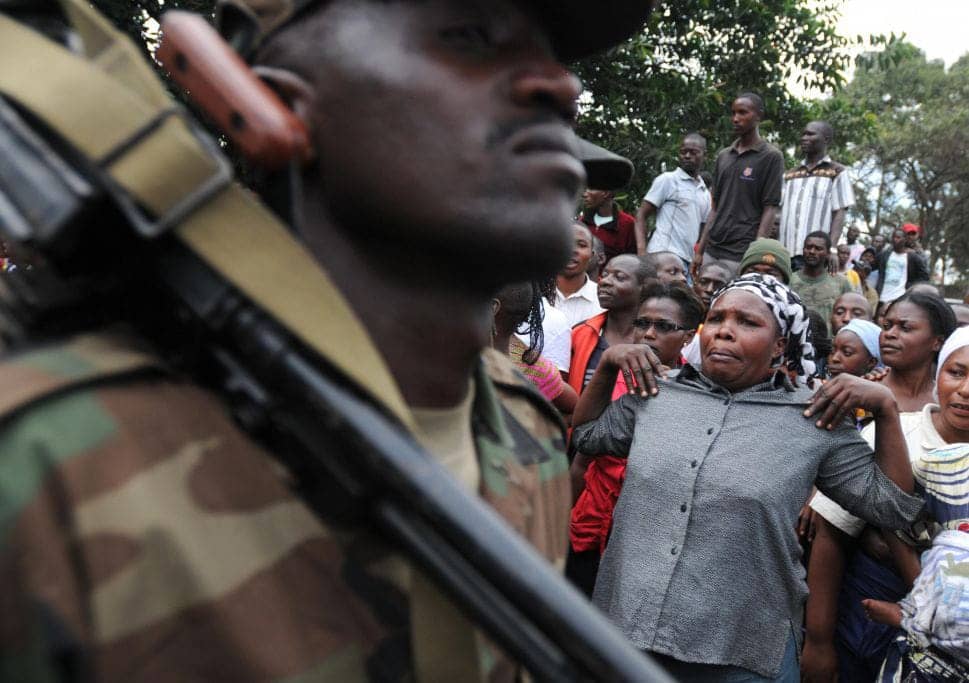 [11]
[11]
But before, during and after the genocide, other Rwanda’s people were killed. Hutus and Tutsis were killed. Is this denying genocide? I don’t feel so. We have to remember that before and after the genocide against the Tutsis, there was also crime against humanity.
Ann: One thing seems especially important to understand here: You were saying that the massacres did not end at the end of the famous hundred days, that the killing continued after that, and both Hutus and Tutsis were killed. Is that right?
Victoire: Of course, of course. The killing was not stopped after 100 days from April to July. After this period, there were many killings. And RPF took the power in July 1994, and after they took power, the killing was going ahead until 1997, when they killed the people in the Congo.
Ann: And you say these were both Hutus and Tutsis who were perceived to be enemies of the government?
Victoire: Yes, of course, there were Hutus and Tutsis, because RPF, when they came in the country, they considered the Tutsis in Rwanda as the enemy who accepted to collaborate with the Hutu government. The RPF, they killed also Tutsis; they did not kill only Hutus, but they killed also Tutsis, like the extremist Hutus killed the Hutus and killed the Tutsis.
Ann: So they killed the Tutsis who had been left behind when they left for Uganda.
Victoire: Yes, yes. For the RPF, the Tutsis who stayed in the country, who worked together with the Hutu government – they saw them as the collaborators of this Hutuist regime. And, they considered – most of them were considered as the enemy.
Ann: OK, now with regard to your trial, you found another lawyer, a Rwandan lawyer, Theogene Muhayeyezu. Then he was arrested; now he’s been released. This is all after Minnesota Law Professor Peter Erlinder came to defend you; he was arrested, he was released and then he was unable to defend you because he is accused himself. Is Theogene Muhayeyezu going to be able to defend you despite having been arrested himself?
Victoire: Yes, the government is trying by all means to isolate me and make sure that I don’t have any lawyers. By so doing, the government hopes to overcome the weakness of the case.
Ann: So is he going to be able to defend you?
Victoire: Yes, yes, because the judge finds that there was one police who saw him and said, “You have to arrest this man because he is the lawyer of Victoire.” He was arrested only because he was my lawyer. And now he is freed, so he can go ahead with his job as my lawyer.
Ann: Are there current dates scheduled for your trial?
Victoire: Not at all. The chief prosecutor said on BBC that he’s still waiting for information from foreign countries. If he was not ready, was not it to bar me from contesting the presidential election?
Ann: Have any of the international legal and human rights organizations that protested Professor Erlinder’s arrest protested your arrest for the same alleged speech crime?
Victoire: Yes, yes, they did. Human Rights Watch, Amnesty International and some individuals did. So did defense lawyers also from the ICTR; they did also.
Ann: Few educated Rwandans with internet access seem to doubt that you were arrested so that the Kagame regime could exclude you from the election, by saying that you cannot contest so long as you are on trial. Do you think that the majority of Rwandans, who are rural subsistence farmers, perceive that this is not a real election?
Victoire: Of course. Although my party has not yet been registered, I have sympathies all over the country. Rural farmers you are talking about are not duped about the coming election.
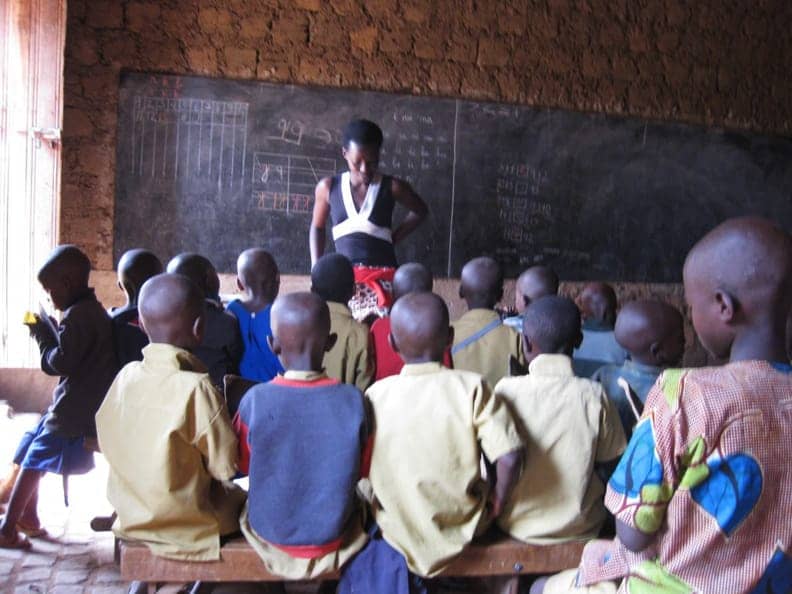 [12]
[12]
They are not happy about their dire situation; they are not happy about the way the government handles the refugees issue because the victims are members of their family or neighbors; they are not happy to be denied their rights; they are not happy about administrative harassing, arrest, detention and gacaca. [Rwanda’s gacaca courts are described as an experimental form of community justice to prosecute prisoners accused of genocide and war crimes. – ed.] They want change the same way urban Rwandans do.
Ann: How do you think they will react to the coming election? Do you think that they will go ahead and vote for the only real candidate? Do you think they will try not to vote? Do you think they’ll be forced to vote? What do you think will happen to them on Aug. 9?
Victoire: Of course we know that will be the problem, but we’ll campaign to ask the population, “Don’t vote because you don’t have choice.” Why they will spend time to go to the vote? Of course they fear intimidation.
Ann: And do you think there are likely to be reprisals against those who don’t vote?
Victoire: We know that the government, the military or the police will use violence against them but, as I say, we have to fight for our rights. There is no reason to vote if you don’t have the choice.
Ann: And what about the election observers who were supposed to come? The EU decided not to send election observers. They gave 5.3 million euro to this National Electoral Commission, even though there’s no real election pending. And now the U.S. and the U.K., actually the Commonwealth, are planning to send observers. Do you want them to come?
Victoire: My question is why they will come, if they know. Everybody knows that Kagame will be elected; he will be the next president for next seven years. Everybody knows it. Why U.K. and U.S. will send the observers if they know that there will be not really the free election in Rwanda. Why they send money? What they do, they [do] not help Rwandese people. This is why I ask them, “Don’t come,” because there is no election in Rwanda. And I don’t see why people would spend time, money and coming here for masquerade election.
Ann: Well, this is a very extreme situation, but I know you haven’t had much chance to talk about your issues because you keep being forced to talk about ethnicity and the history of the genocide. Let’s step back from the current danger and talk about your vision for Rwanda.
In a recent study, Dr. Ann Ansoms of the University of Antwerp reported that 90 percent of Rwandans are rural subsistence farmers who speak only their native Kinyarwanda language and that the majority live in poverty and that the poverty has increased since the 1994 Rwanda genocide, despite all the claims about Rwanda being a development miracle. She reports export mono-crops produced on land concentrated in a few hands, Kagame virtually abandoning the rural population to build a shimmering modern city, Kigali, and educate a privileged technical elite.
The Rusesabagina Foundation says, quote, that “one third of Rwanda’s population suffers from malnutrition, that life expectancy is only 44 years, and that wealth and power is all concentrated in the cities, leaving 92 percent of the poor in underrepresented rural areas.” Does that sound like an accurate picture of Rwanda to you and what do you think needs to be done?
Victoire: The most urgent action is to review agriculture policy and enhance forest management. The rural population in Rwanda has been neglected for the last 16 years and, instead of the Singapore model of development, which gives the lion’s share to an urban privileged elite, I would invest in agriculture, I would invest in rural roads and health network, I would review the land management and I would give priority to the subsistence food crop, rather than cash crops which benefit mostly to traders from urban areas.
Ann: OK, we’ve touched on this a number of times, that the vast majority of Rwandans eat what they’re able to grow on their land. But this is so fundamental to what most Rwandans experience that I’m going to ask you to make it very simple.
Victoire: For example, ask people to cultivate only maize – if you ask them to cultivate only maize for export – but what they will eat? This is why I will give priority to enough food for my people.
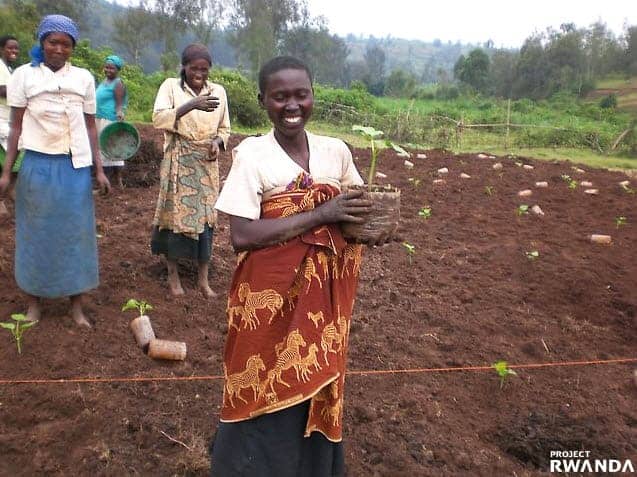 [13]
[13]
Ann: And what about this jatropha biofuels planting project? This was undertaken, I know, by Eco-Fuel Global, a multinational corporation headquartered just across San Francisco Bay from where I’m speaking to you, in Walnut Creek. And before returning to Rwanda, you and your party published a very critical essay about the government’s decision to engage with Eco-Fuel Global to plant fuel crops for export, despite widespread hunger and a shortage of land for food crops.
Victoire: Yes, this is an example of the lack of vision by the current regime. How you can complain about food shortage and give land for biofuel plants? And now the people there, they fight against this project. Everybody knows that in many countries in Africa, like Mozambique, these projects have been turned down, but they are welcome in Rwanda. I cannot understand it.
Ann: Biofuels planting has been turned down in Mozambique?
Victoire: Turned down in Mozambique, in Burkina Faso, in many countries in Africa.
Ann: What about the natural gas in Lake Kivu? There’s said to be $20 billion worth of natural gas in Lake Kivu, but the lake is very dangerously C02 dense. If it’s drilled carelessly, it could explode C02 and asphyxiate people on either side.
Victoire: Yes, we know that it’s dangerous to exploit the gas in Lake Kivu, but we know also that there are some companies outside who can exploit this gas without danger. This is why we say, the project we have now, we have to stop it and look if we can find a company who can exploit this gas without danger to the population who live in the area of Kivu.
Ann: As i understand it, there is a plan for drawing off the C02 so that the natural gas can be drilled, but the Kagame regime has said they’re not responsible for that; they don’t have to bother.
Victoire: This shows that the government of Kagame doesn’t have any responsibility about the people. Of course Rwanda needs money, but if we have a project where we can get money, but it is dangerous for your people, you have to choose. And the government of Kagame chose the money.
It is the duty to protect people before you find money. If you have money but your people are killed, what you will do with this money?
Ann: Lake Kivu often seems like a metaphor for Rwanda, because the C02 is so dangerously dense that it needs to be drawn off before there’s a lethal explosion, perhaps like the political tension in Rwanda needs to be released by reconciliation?
Victoire: Reconciliation. Mmm-hmm, go ahead.
Ann: You have a plan for a truth and reconciliation commission, don’t you?
Victoire: Yes, of course. I take the example of South Africa, where there is a commission about truth and reconciliation and this commission helped people not to revenge, but to talk about what happened, who was involved, what really happened and how together we can go ahead. And that’s what we need in Rwanda.
But we have to let the people be free to talk about what they saw, what happened with them, to talk with the killers, to accept, to give forgiveness. But you cannot push people to give forgiveness, and you cannot push the people, [telling them] don’t talk about the crime committed by the neighbor against the family that they lose.
Ann: One of your supporters in the United States told me that an important part of the healing process is that Hutus need to be able to mourn and bury their dead, which they can’t do publicly because the official version of the genocide doesn’t allow them to acknowledge their loss.
Victoire: Yes, there are many people in Rwanda who see Hutus as killers. For them, Hutus, they are killers. But that is not true. Everybody knows that not all Hutus were involved in the killing of the Tutsis. We cannot take this picture that the Hutus, they are killers, and the Tutsis, they are victims. That is not true.
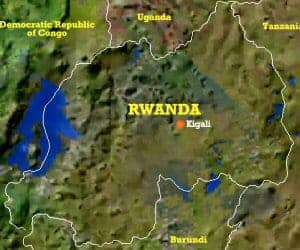 [15]
[15]
There are extremists by both ethnic groups. There are extremists in the Tutsis group. There are extremists in the Hutus group; they were involved in the killing of the people. And these extremists have to be brought to the court. And some members of RPF killed people, and that is the problem that the Kagame regime cannot resolve.
Ann: OK, let’s talk about politics and the press for a moment. The independent Kinyarwanda language newspapers Umuseso and Umuvugizi have both been shut down. The editors have fled to Uganda and now the editor and staff of Umurabyo have been arrested and imprisoned. On June 24, Umuvugizi journalist Jean Leonard Rugambage was gunned down in the streets of Kigali outside his home.
This leaves only the state controlled media outlets and perhaps the Rwanda News Agency, which seems to be under a lot of state pressure. The police were calling you in for interrogation several times a week before they finally arrested you and forbade you to leave the city of Kigali. So, without independent press and without freedom to travel, have you had any way to make contact with the rural population who are the majority of Rwandans?
Victoire: Yes, we know the agenda of the government is to sever links between me and the population. Despite government harassment, the party had managed to gather the number of signatures we need. I was ready to register my political party. People all over the country know my fight for change and want to hear more from me, but I have been denied any contact via public or private media. But the Rwanda people should know that so long as I breathe, I will keep on my combat.
Ann: I’ve heard that Rwanda has quite an oral tradition, that even if there isn’t any published media that the word travels from village to village.
Victoire: Of course. They can hear the radio. There are different Rwandese radios in the country, but we use BBC and Voice of America because we cannot use the public or private radios. But the majority of Rwandese people, they cannot read. You tell your story to your neighbor and your neighbor tells the story to the other, and in two days the whole country is informed about it. It is why, if I don’t have access to the media but we have representation in different areas in the country and we give them the information, in two days, the whole country knows the information we need to give to the population.
Ann: So they know who you are; they know what has been happening.
Victoire: Of course. They don’t need media to know who I am. Everybody knows who I am. Now all Rwandans in the country and outside, they know who is Victoire. And this is why the regime of Kagame does everything to prevent that I participate in the election, because they know that if I will participate, they will lose the election. Kagame will lose the election.
Ann: How would you change Rwanda’s relationship to its neighbor, the Democratic Republic of Congo, where more than 6 million war dead have been reported since 1996, largely consequent to Rwanda and Uganda’s invasions beginning in that year?
Victoire: The stumbling block is the refugees issue. For the last 16 years or so, the current regime has attempted to settle this refugee problem through military invasion. It is this problem which poisoned the relation between Rwanda and Congo – DRC – and Uganda. And we have to resolve this problem, not militarily, but through dialogue.
Ann: My internet telephonic connection with Victoire began to crack and became almost unintelligible at this point and I wasn’t able to reconnect and sustain a stable connection, but I had asked her whether there was anything else she’d like to say.
Victoire: [Ann reading:] I want to be a leader of all Rwandans seeking political change which can help us overcome ethnic division and embrace a new vision where people are judged on the basis of what they contribute to the welfare of their country and not which party, racial or ethnic group they belong to.
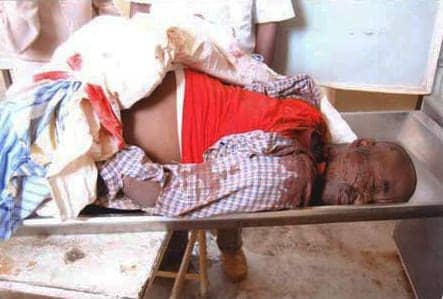 [17]
[17]
I dream of a Rwanda where people gather around ideas and not ethnicity, a country respected for its value and not its military might.
Ann: Rwanda is indeed the most formidable African military power in East and Central Africa, and the other opposition parties, the Democratic Green Party of Rwanda and the Parti Social Imberakuri, have joined Victoire in calling for a shift away from military expense and adventure.
After my conversation with her, on July 11, the vice president of the Democratic Green Party of Rwanda was found beheaded with a machete left near the body in southern Rwanda, and International Criminal Tribunal on Rwanda defense lawyer Jwani Mwaikusa was gunned down in Dar es Salaam, where he lived and taught at the law school at the University of Dar es Salaam.
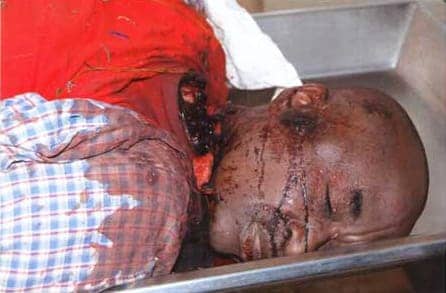 [18]On July 24, Victoire reported that Rwandan police entered the courtyard of the house that she and her party staff had been renting in Kigali and beat and arrested two of her FDU-Inkingi Party members. She vowed to continue her struggle even after incumbent President Paul Kagame declared victory in what much of the world perceived as an election masquerade, complete with election observers from the U.S. and the Commonwealth.
[18]On July 24, Victoire reported that Rwandan police entered the courtyard of the house that she and her party staff had been renting in Kigali and beat and arrested two of her FDU-Inkingi Party members. She vowed to continue her struggle even after incumbent President Paul Kagame declared victory in what much of the world perceived as an election masquerade, complete with election observers from the U.S. and the Commonwealth.
For Women’s International News Gathering Service, this has been Ann Garrison interviewing Victoire Ingabire Umuhoza.
San Francisco writer Ann Garrison writes for the San Francisco Bay View, [19] Digital Journal [20], Examiner.com [21], OpEdNews [22], Global Research [23], Colored Opinions [24] and her blog, Plutocracy Now [25]. She can be reached at anniegarrison@gmail.com [26].
 [2]
[2]Victoire Ingabire Umuhoza, called by many President Paul Kagame’s leading challenger, remains under house arrest in Kigali, Rwanda.
On Aug. 13, President Barack Obama’s National Security Council issued a statement [5] expressing concern about disturbing events leading up to the polls, including human rights abuse, suppression of the press and the exclusion of the opposition. NSC spokesman Mike Hammer wrote: “Democracy is about more than holding elections. A democracy reflects the will of the people, where minority voices are heard and respected, where opposition candidates run on the issues without threat or intimidation, where freedom of expression and freedom of the press are protected.”
The statement, notably, did not congratulate President Paul Kagame on his re-election.
Human rights activists and Africa advocates, including the Africa Faith and Justice Network [7] and Friends of the Congo [8], have called for sustained attention on Rwanda, suspension of all military aid and a freeze on $240 million worth of non-military aid until Kagame releases all political prisoners, lifts bans on the press and opens political space. All the issues that Victoire and I discussed in July and throughout this year remain, including:
- political opponents still missing, in prison, or, like Victoire Ingabire, still indicted under Rwanda’s repressive laws against speech crime
- no response to Human Rights Watch, Amnesty International and opposition calls for investigation of recent political assassinations
- suppression of the press;
- extreme rural poverty and increasing inequality between the majority rural population and a privileged urban elite;
- mono-cropping that exhausts the soil and leaves Rwandans hungry for the sake of agricultural exports enriching the elite;
- biofuels crops planted on scarce Rwandan agricultural land by a California-based multinational, despite widespread hunger;
- natural gas extraction in Lake Kivu, endangering the populations on both the Rwanda and Congo sides of the lake;
- refugees in Rwanda’s neighbors, DR Congo and Uganda, who are an excuse for military incursion by the Rwandan Defense Force.
Listen to the broadcast
Audio clip: Adobe Flash Player (version 9 or above) is required to play this audio clip. Download the latest version here [9]. You also need to have JavaScript enabled in your browser.
Transcript
WINGS host Frieda Werden: Rwanda’s Aug. 9, 2010, presidential election had a foregone conclusion: another term for Paul Kagame, the U.S.-backed Tutsi general who led the takeover of 1994. One of Kagame’s most prominent opponents is Victoire Ingabire Umuhoza, who chairs the United Democratic Forces. She speaks with Ann Garrison in today’s edition of WINGS. [musical interlude]Welcome to WINGS, a series of news and current affairs programs by and about women around the world, produced and distributed by the Womens’ International News Gathering Service.
Ann Garrison: In January this year, 2010, Victoire Ingabire Umuhoza returned to her native Rwanda, an East African nation of 10 million people. She had been in Europe for 16 years, where she earned degrees in business and commercial law, worked for an international accounting firm, married and had three children, and became the exile leader of the Unified Democratic Forces, a coalition of Rwandan political parties.
 [10]
[10]Rwanda Trading Co. workers sort coffee beans for sale to Starbucks, Folgers and other buyers in the West. The students who toured the private factory and took this photo as part of ONE Campus Challenge, a friendly competition to determine which university's student body has the most effective global poverty-fighting campaign, were impressed with what they were told about the coffee farmers’ earnings. They apparently didn’t learn that farm families encouraged to use their small landholdings only for cash crops rather than food often go hungry. – Photo: One.org
Three months after her return, in a speech commemorating the victims of the 1994 Rwanda genocide, President Paul Kagame referred to her as a political hooligan but refused to speak her name:
Rwandan President Paul Kagame (recorded on April 7, 2010): “Some people want to encourage political hooliganism. Some people just come from nowhere, useless people. I see every time in the pictures, you know, some lady, who had her deputy, a genocide criminal, her deputy, talking about, you know, “You know there is Rwanda genocide, but there is another” – so that is politics. And the world says “the opposition leader!” Well, I know those who say it and who support that. They know it is wrong, but it is an expression of contempt these people have for Rwandans and for Africans, that they think Africans deserve to be led by these hooligans. And that’s – to that we say no, a big no. And if anybody wants a fight there, we will give them a fight.”
Ann: Kagame has indeed, since that statement, given Victoire and all his other serious political opponents a big fight, though few would call it a fair one. On June 24, Rwandan police surrounded the house Victoire had been renting in Kigali and threw up roadblocks to prevent her exit or entry. On the same day, police arrested another presidential candidate, Bernard Ntaganda, several of Ntaganda’s party members disappeared, and police arrested dozens of opposition party members who were attempting to protest their exclusion from the presidential election, which was, by then, only six weeks away. Also on the same day, Umuvugizi journalist Jean Leonard Rugambage was gunned down in front of his home in Kigali after he reported that Rwandan President Paul Kagame had ordered the assassination attempt on an exiled Rwandan general in Johannesburg, South Africa.
Reports of arrest, torture and even assassination of opposition politicians and press critical of Kagame have continued since.
On July 11, Victoire Ingabire spoke to WINGS from Kigali, despite the state’s warning that she might be arrested again if she continues to speak to the press. She speaks Dutch, French and her native Kinyarwanda language and, in recent months, she has learned English so as to speak to citizens of the U.S. and the U.K., the powers that have been dominant in the region since the Rwanda genocide.
Ann: Welcome, Victoire, and thank you for agreeing to speak to WINGS, despite the danger that it puts you in.
Victoire: You are welcome and thank you for your interest for the plight of Rwanda people.
Ann: Can you describe the state of your party, the FDU-Inkingi Party, and the opposition parties today? How many remain under arrest? How many have been freed? How many are missing?
Victoire: So far, only two members of opposition arrested on 24 June remain in detention. You know that Bernard Ntaganda, the founder and president of PS Imberakuri [political party] is still in jail. And Alice Muhirwa, who is the treasurer of FDU-Inkingi, you know that she is now still recovering from torture meted against her by police during her detention. And Mr. Luswanga Toba, the secretary of Mr. Ntaganda, who disappeared on 20 June – even till today, we don’t know where he is.
And there are also seven members of PS Imberakuri – we don’t know where they are. And people complained to the court about torture and showed the scars and the other evidence of torture. But the ruling of the judge eluded this issue. It is a kind of blank check to the police to go on torturing people. And I was also shocked to hear that the police tried to corner them into giving false evidence against Bernard Ntaganda and myself.
Ann: Are Human Rights Watch and Amnesty International present?
Victoire: The office of Amnesty International is based in Kampala; they are not every day in Rwanda. And you know that the government of Kagame refused the visa to the person of Human Rights. We don’t have any permanent office for Human Rights or Amnesty International.
Ann: I spoke to Frank Habineza, chair of the Democratic Green Party of Rwanda and the African Greens Federation, who said that there are now highly armed military foot patrols with their fingers on the triggers at almost all small roads and paths in the city of Kigali and at road blocks in some places. Is that what you see happening? And if so, how are you encouraging Rwandans to respond?
Victoire: Yes, there is a heavy deployment of security personnel. I encourage Rwandese people to fight for their rights but not to respond to the provocation because it would be playing the game of the regime.
Ann: They want to provoke the population into responding violently so that they can respond violently themselves?
Victoire: Of course. This is why I ask the Rwandese people, “Don’t respond to the provocation.”
Ann: And how would you like the rest of the world to be responding to this now? How would you like the so-called international community to respond?
Victoire: You know, I have called the international community, especially the countries backing the current regime, to realize that they are not doing a service to the people of Rwanda by supporting an uncompromising regime. It is in nobody’s interest to keep on the current standoff.
Ann: Now with regard to your own arrest, indictment and trial. You’re accused of disputing the official history of the Rwanda genocide, which is that extremist Hutus planned genocide against the Tutsis and then killed a million Tutsis within 100 days in 1994, though the phrase is often “Tutsis and moderate Hutus.” How do you understand the Rwanda genocide of 1994 and what would you most like the world to understand about it?
Victoire: First, you have to know that my party and I have never denied the genocide by the U.N. understanding because the Resolution 955 from U.N. says that in Rwanda was genocide against the Rwandan people. And that was, like you say, there was genocide against Tutsis and moderate Hutus. We don’t have to forget that. Yes, there was genocide and all people involved should be brought to the court.
 [11]
[11]The caption for this photo, appearing in the July-August issue of Foreign Policy, is written by Elizabeth Dickinson: “Rwandan soldiers return home after operations in the eastern provinces of the Democratic Republic of the Congo, where they participated in joint operations against rebel militias there. The country's president, Paul Kagame, himself a former soldier, has helped supercharge the Rwandan economy following the 1994 genocide. Many worry that political repression is setting in, however, as Kagame consolidates power.” – Photo: Lionel Healing, AFP/Getty Images
Ann: One thing seems especially important to understand here: You were saying that the massacres did not end at the end of the famous hundred days, that the killing continued after that, and both Hutus and Tutsis were killed. Is that right?
Victoire: Of course, of course. The killing was not stopped after 100 days from April to July. After this period, there were many killings. And RPF took the power in July 1994, and after they took power, the killing was going ahead until 1997, when they killed the people in the Congo.
Ann: And you say these were both Hutus and Tutsis who were perceived to be enemies of the government?
Victoire: Yes, of course, there were Hutus and Tutsis, because RPF, when they came in the country, they considered the Tutsis in Rwanda as the enemy who accepted to collaborate with the Hutu government. The RPF, they killed also Tutsis; they did not kill only Hutus, but they killed also Tutsis, like the extremist Hutus killed the Hutus and killed the Tutsis.
Ann: So they killed the Tutsis who had been left behind when they left for Uganda.
Victoire: Yes, yes. For the RPF, the Tutsis who stayed in the country, who worked together with the Hutu government – they saw them as the collaborators of this Hutuist regime. And, they considered – most of them were considered as the enemy.
Ann: OK, now with regard to your trial, you found another lawyer, a Rwandan lawyer, Theogene Muhayeyezu. Then he was arrested; now he’s been released. This is all after Minnesota Law Professor Peter Erlinder came to defend you; he was arrested, he was released and then he was unable to defend you because he is accused himself. Is Theogene Muhayeyezu going to be able to defend you despite having been arrested himself?
Victoire: Yes, the government is trying by all means to isolate me and make sure that I don’t have any lawyers. By so doing, the government hopes to overcome the weakness of the case.
Ann: So is he going to be able to defend you?
Victoire: Yes, yes, because the judge finds that there was one police who saw him and said, “You have to arrest this man because he is the lawyer of Victoire.” He was arrested only because he was my lawyer. And now he is freed, so he can go ahead with his job as my lawyer.
Ann: Are there current dates scheduled for your trial?
Victoire: Not at all. The chief prosecutor said on BBC that he’s still waiting for information from foreign countries. If he was not ready, was not it to bar me from contesting the presidential election?
Ann: Have any of the international legal and human rights organizations that protested Professor Erlinder’s arrest protested your arrest for the same alleged speech crime?
Victoire: Yes, yes, they did. Human Rights Watch, Amnesty International and some individuals did. So did defense lawyers also from the ICTR; they did also.
Ann: Few educated Rwandans with internet access seem to doubt that you were arrested so that the Kagame regime could exclude you from the election, by saying that you cannot contest so long as you are on trial. Do you think that the majority of Rwandans, who are rural subsistence farmers, perceive that this is not a real election?
Victoire: Of course. Although my party has not yet been registered, I have sympathies all over the country. Rural farmers you are talking about are not duped about the coming election.
 [12]
[12]The U.S. and European volunteers who traveled to Rwanda to renovate this school, which had been neglected by the government, wrote: “Presently, 597 children are enrolled at the Ntenyo Primary School but there has been a significant decrease in actual attendance because the school’s facilities have severely deteriorated and are not up to government standard. For all of the 597 children at the school there are nine teachers for six classrooms [over 66 children per teacher] with nothing more than a few blackboards, limited benches and scant basic materials. This is clearly not an ideal learning environment. It significantly decreases the chances of children being able to continue their education into high school.” – Photo: Sanejo.org
Ann: How do you think they will react to the coming election? Do you think that they will go ahead and vote for the only real candidate? Do you think they will try not to vote? Do you think they’ll be forced to vote? What do you think will happen to them on Aug. 9?
Victoire: Of course we know that will be the problem, but we’ll campaign to ask the population, “Don’t vote because you don’t have choice.” Why they will spend time to go to the vote? Of course they fear intimidation.
Ann: And do you think there are likely to be reprisals against those who don’t vote?
Victoire: We know that the government, the military or the police will use violence against them but, as I say, we have to fight for our rights. There is no reason to vote if you don’t have the choice.
Ann: And what about the election observers who were supposed to come? The EU decided not to send election observers. They gave 5.3 million euro to this National Electoral Commission, even though there’s no real election pending. And now the U.S. and the U.K., actually the Commonwealth, are planning to send observers. Do you want them to come?
Victoire: My question is why they will come, if they know. Everybody knows that Kagame will be elected; he will be the next president for next seven years. Everybody knows it. Why U.K. and U.S. will send the observers if they know that there will be not really the free election in Rwanda. Why they send money? What they do, they [do] not help Rwandese people. This is why I ask them, “Don’t come,” because there is no election in Rwanda. And I don’t see why people would spend time, money and coming here for masquerade election.
Ann: Well, this is a very extreme situation, but I know you haven’t had much chance to talk about your issues because you keep being forced to talk about ethnicity and the history of the genocide. Let’s step back from the current danger and talk about your vision for Rwanda.
In a recent study, Dr. Ann Ansoms of the University of Antwerp reported that 90 percent of Rwandans are rural subsistence farmers who speak only their native Kinyarwanda language and that the majority live in poverty and that the poverty has increased since the 1994 Rwanda genocide, despite all the claims about Rwanda being a development miracle. She reports export mono-crops produced on land concentrated in a few hands, Kagame virtually abandoning the rural population to build a shimmering modern city, Kigali, and educate a privileged technical elite.
The Rusesabagina Foundation says, quote, that “one third of Rwanda’s population suffers from malnutrition, that life expectancy is only 44 years, and that wealth and power is all concentrated in the cities, leaving 92 percent of the poor in underrepresented rural areas.” Does that sound like an accurate picture of Rwanda to you and what do you think needs to be done?
Victoire: The most urgent action is to review agriculture policy and enhance forest management. The rural population in Rwanda has been neglected for the last 16 years and, instead of the Singapore model of development, which gives the lion’s share to an urban privileged elite, I would invest in agriculture, I would invest in rural roads and health network, I would review the land management and I would give priority to the subsistence food crop, rather than cash crops which benefit mostly to traders from urban areas.
Ann: OK, we’ve touched on this a number of times, that the vast majority of Rwandans eat what they’re able to grow on their land. But this is so fundamental to what most Rwandans experience that I’m going to ask you to make it very simple.
Victoire: For example, ask people to cultivate only maize – if you ask them to cultivate only maize for export – but what they will eat? This is why I will give priority to enough food for my people.
 [13]
[13]With high hopes, Rwandan women plant jatropha, promoted as a miracle biofuel crop that would thrive on marginal land, thus not displacing food crops. Yields on less fertile land, however, have proven meager. – Photo: ProjectRwanda.org
Victoire: Yes, this is an example of the lack of vision by the current regime. How you can complain about food shortage and give land for biofuel plants? And now the people there, they fight against this project. Everybody knows that in many countries in Africa, like Mozambique, these projects have been turned down, but they are welcome in Rwanda. I cannot understand it.
Ann: Biofuels planting has been turned down in Mozambique?
Victoire: Turned down in Mozambique, in Burkina Faso, in many countries in Africa.
Ann: What about the natural gas in Lake Kivu? There’s said to be $20 billion worth of natural gas in Lake Kivu, but the lake is very dangerously C02 dense. If it’s drilled carelessly, it could explode C02 and asphyxiate people on either side.
Victoire: Yes, we know that it’s dangerous to exploit the gas in Lake Kivu, but we know also that there are some companies outside who can exploit this gas without danger. This is why we say, the project we have now, we have to stop it and look if we can find a company who can exploit this gas without danger to the population who live in the area of Kivu.
Ann: As i understand it, there is a plan for drawing off the C02 so that the natural gas can be drilled, but the Kagame regime has said they’re not responsible for that; they don’t have to bother.
Victoire: This shows that the government of Kagame doesn’t have any responsibility about the people. Of course Rwanda needs money, but if we have a project where we can get money, but it is dangerous for your people, you have to choose. And the government of Kagame chose the money.
It is the duty to protect people before you find money. If you have money but your people are killed, what you will do with this money?
Ann: Lake Kivu often seems like a metaphor for Rwanda, because the C02 is so dangerously dense that it needs to be drawn off before there’s a lethal explosion, perhaps like the political tension in Rwanda needs to be released by reconciliation?
Victoire: Reconciliation. Mmm-hmm, go ahead.
Ann: You have a plan for a truth and reconciliation commission, don’t you?
Victoire: Yes, of course. I take the example of South Africa, where there is a commission about truth and reconciliation and this commission helped people not to revenge, but to talk about what happened, who was involved, what really happened and how together we can go ahead. And that’s what we need in Rwanda.
But we have to let the people be free to talk about what they saw, what happened with them, to talk with the killers, to accept, to give forgiveness. But you cannot push people to give forgiveness, and you cannot push the people, [telling them] don’t talk about the crime committed by the neighbor against the family that they lose.
Ann: One of your supporters in the United States told me that an important part of the healing process is that Hutus need to be able to mourn and bury their dead, which they can’t do publicly because the official version of the genocide doesn’t allow them to acknowledge their loss.
Victoire: Yes, there are many people in Rwanda who see Hutus as killers. For them, Hutus, they are killers. But that is not true. Everybody knows that not all Hutus were involved in the killing of the Tutsis. We cannot take this picture that the Hutus, they are killers, and the Tutsis, they are victims. That is not true.
 [15]
[15]The large lake shown in this map of Rwanda is Lake Kivu, shared by Rwanda and the Democratic Republic of Congo.
Ann: OK, let’s talk about politics and the press for a moment. The independent Kinyarwanda language newspapers Umuseso and Umuvugizi have both been shut down. The editors have fled to Uganda and now the editor and staff of Umurabyo have been arrested and imprisoned. On June 24, Umuvugizi journalist Jean Leonard Rugambage was gunned down in the streets of Kigali outside his home.
This leaves only the state controlled media outlets and perhaps the Rwanda News Agency, which seems to be under a lot of state pressure. The police were calling you in for interrogation several times a week before they finally arrested you and forbade you to leave the city of Kigali. So, without independent press and without freedom to travel, have you had any way to make contact with the rural population who are the majority of Rwandans?
Victoire: Yes, we know the agenda of the government is to sever links between me and the population. Despite government harassment, the party had managed to gather the number of signatures we need. I was ready to register my political party. People all over the country know my fight for change and want to hear more from me, but I have been denied any contact via public or private media. But the Rwanda people should know that so long as I breathe, I will keep on my combat.
Ann: I’ve heard that Rwanda has quite an oral tradition, that even if there isn’t any published media that the word travels from village to village.
Victoire: Of course. They can hear the radio. There are different Rwandese radios in the country, but we use BBC and Voice of America because we cannot use the public or private radios. But the majority of Rwandese people, they cannot read. You tell your story to your neighbor and your neighbor tells the story to the other, and in two days the whole country is informed about it. It is why, if I don’t have access to the media but we have representation in different areas in the country and we give them the information, in two days, the whole country knows the information we need to give to the population.
Ann: So they know who you are; they know what has been happening.
Victoire: Of course. They don’t need media to know who I am. Everybody knows who I am. Now all Rwandans in the country and outside, they know who is Victoire. And this is why the regime of Kagame does everything to prevent that I participate in the election, because they know that if I will participate, they will lose the election. Kagame will lose the election.
Ann: How would you change Rwanda’s relationship to its neighbor, the Democratic Republic of Congo, where more than 6 million war dead have been reported since 1996, largely consequent to Rwanda and Uganda’s invasions beginning in that year?
Victoire: The stumbling block is the refugees issue. For the last 16 years or so, the current regime has attempted to settle this refugee problem through military invasion. It is this problem which poisoned the relation between Rwanda and Congo – DRC – and Uganda. And we have to resolve this problem, not militarily, but through dialogue.
Ann: My internet telephonic connection with Victoire began to crack and became almost unintelligible at this point and I wasn’t able to reconnect and sustain a stable connection, but I had asked her whether there was anything else she’d like to say.
Victoire: [Ann reading:] I want to be a leader of all Rwandans seeking political change which can help us overcome ethnic division and embrace a new vision where people are judged on the basis of what they contribute to the welfare of their country and not which party, racial or ethnic group they belong to.
 [17]
[17]On July 14, amid escalating election violence and repression, Democratic Green Party of Rwanda Vice President Andre Kagwa Kwisereka was found beheaded, with a machete left nearby, in the wetlands of the Makula River in Rwanda's Butare Province, his grisly murder reminiscent of the Rwanda genocide, in which upwards of a million people were killed, many with machetes.
Ann: Rwanda is indeed the most formidable African military power in East and Central Africa, and the other opposition parties, the Democratic Green Party of Rwanda and the Parti Social Imberakuri, have joined Victoire in calling for a shift away from military expense and adventure.
After my conversation with her, on July 11, the vice president of the Democratic Green Party of Rwanda was found beheaded with a machete left near the body in southern Rwanda, and International Criminal Tribunal on Rwanda defense lawyer Jwani Mwaikusa was gunned down in Dar es Salaam, where he lived and taught at the law school at the University of Dar es Salaam.
 [18]On July 24, Victoire reported that Rwandan police entered the courtyard of the house that she and her party staff had been renting in Kigali and beat and arrested two of her FDU-Inkingi Party members. She vowed to continue her struggle even after incumbent President Paul Kagame declared victory in what much of the world perceived as an election masquerade, complete with election observers from the U.S. and the Commonwealth.
[18]On July 24, Victoire reported that Rwandan police entered the courtyard of the house that she and her party staff had been renting in Kigali and beat and arrested two of her FDU-Inkingi Party members. She vowed to continue her struggle even after incumbent President Paul Kagame declared victory in what much of the world perceived as an election masquerade, complete with election observers from the U.S. and the Commonwealth.For Women’s International News Gathering Service, this has been Ann Garrison interviewing Victoire Ingabire Umuhoza.
San Francisco writer Ann Garrison writes for the San Francisco Bay View, [19] Digital Journal [20], Examiner.com [21], OpEdNews [22], Global Research [23], Colored Opinions [24] and her blog, Plutocracy Now [25]. She can be reached at anniegarrison@gmail.com [26].
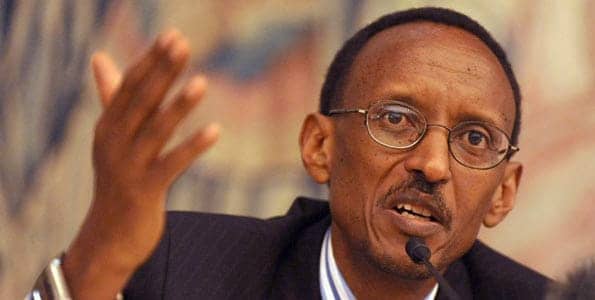
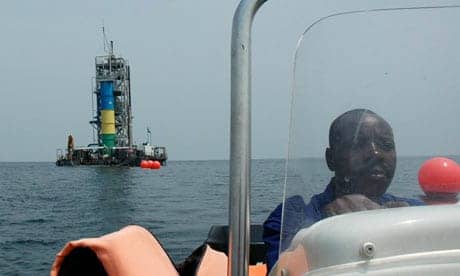
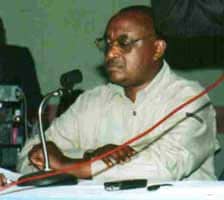
No comments:
Post a Comment